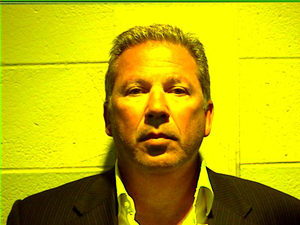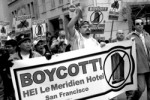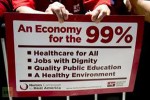Chicago Window Plant Occupiers Win Reprieve, Former CEO Faces Felony Fraud Charges
UE Occupies Chicago Window Plant Again, and Wins Reprieve
By Jane Slaughter
Labor Notes
Members of the United Electrical (UE) Workers won another reprieve for a Chicago window factory, re-occupying the plant they famously held in 2008.
UE Local 1110 members took over the Serious Materials plant yesterday after being told by local management that the factory would close immediately.

Vicente Rangel, Armando Robles, United Electrical, Radio and Machine Workers of America Local 1110 President; and Leah Fried, were among the workers and union representatives banding together at the company called Serious Materials Inc., on Thursday, Feb 23rd, 2012, amid reports that the company was going out of business. About 65 workers gathered inside to figure out how to proceed (Terrence Antonio James/Chicago Tribune).

Supporters gather outside the Serious Materials factory, formerly operated by the Republic Windows and Doors company, on Thursday Feb 23rd, 2012. (Photo: Micah Uetricht)
When they were confronted with the same news in 2008, workers voted unanimously to occupy their workplace, guarding the machines at the former Republic Windows and Doors for six days until the major creditor, Bank of America, released $1.75 million in wages and benefits owed the workers.
Republic sold the plant to Serious and workers celebrated as the first sit-down strike in years won a favorable settlement in the teeth of the great recession.
This week’s plant closing came with no warning. The union got a call from the boss that he wanted a meeting, but he wouldn’t say why. Officers and UE staff were summoned to the offices of the notorious union-busting law firm Seyfarth and Shaw at 9 a.m. yesterday.
There executives said they would close the plant, effective immediately. Workers would be put on leave while management dismantled the window-making machinery and shipped it to the company’s other plants in Pennsylvania and Colorado.
Workers would be paid what they were owed under the WARN Act, which requires employers to provide notice 60 days ahead of plant closings and mass layoffs. (The penalty for violations is up to two months of pay and benefits.)
But the provisions typically only apply to businesses that would lay off 50 or more.
Illinois has a stronger law, which requires notice when 25 or more full-time employees will lose their jobs, and gives the director of the state labor department the right to investigate the company’s books.
Management provided nothing in writing to back up its promises.
Union officers—Armando Robles, Ricky Maclin, and Vicente Rangel—and staffers spent three hours arguing with management that the closure was unacceptable. Serious had a legal and moral obligation to do more to try to save the jobs, they said.
“We wanted to find a buyer,”
said UE rep Leah Fried,
“but they were not interested. They said it was not an option.”
Meanwhile, the Serious workers were building windows inside the plant.
February is not a big time for demand for windows, and their numbers were down to 38 after a recent layoff. Only 75 of the original 240 workers had ever been called back after Serious bought the plant from Republic.
All Out
President Robles and Fried left the meeting with management Thursday and began calling laid-off workers, asking them to come to the plant. At 2 p.m., the end of the shift, 50 workers met to discuss their options.
Robles presented them soberly: Do nothing, or fight—stay and occupy the plant again. Without much hullabaloo, matter-of-factly, the members voted unanimously to occupy.
They had no food, no sleeping bags. Workers and leaders immediately started to phone fellow workers, allies, and the media. They called the local alderman and asked others to alert the mayor’s office. Occupy Chicago came with tacos. Stand Up Chicago arrived.
Workers from other UE locals, including recently organized railroad van drivers, were there. Republic workers who’d never been called back to Serious but who still came to union meetings were there.
The crowd inside grew to 65 and outside to 100.
UE regional president Carl Rosen called Serious’s CEO Kevin Surace at headquarters in California and asked,
“Do you really want to go this route? If it comes to it, we’ll be dragged out and arrested.”
Fried wondered if Serious understood who they were dealing with.
“These are people who won’t take this lightly,” she said.
“They take this personally. They need jobs. And the political climate has changed. Now there’s a whole Occupy movement that was inspired by us. We’re sort of ground zero of Occupy.”
Meanwhile, local management called the police. A half dozen cops informed the workers that they had five minutes to decide whether to leave peacefully or get arrested.
They didn’t make good on the threat, but they refused to let the pizzas provided by Stand Up Chicago inside until a local pastor intervened, as local TV news cameras whirred.
“Let the workers eat!”
chanted the crowd.
The cops backed off but wouldn’t let anyone leave and then go back inside.
By 5 p.m. a crowd had gathered outside. Occupy Chicago started to raise tents, showing how a culture to prepare and stick it out has developed since the last occupation, Fried said. The cold rain started to freeze.
Inside, workers played dominoes and tried to watch the coverage on an old, snowy TV. They had plenty of donated food—enough to share with their supporters outside.
Negotiations shifted when corporate decision makers got on the phone. Management in California took over, apparently deciding they didn’t want a big showdown.
At 1 a.m., a tentative agreement was reached that met all of the workers’ concerns. The plant will remain open, making windows, for 90 days. That’s in writing.
Serious is committed to finding new ownership. Local union leaders are also interested in the possibility of a worker-run enterprise and are talking with consultants who specialize in converting factories to co-ops.
Serious said it had never been able to get a foothold in Chicago and Midwest markets. Workers for years had offered help and suggestions, to no avail.
“We started the morning with the plant closing and ended the day with work and a chance to save our jobs,” said Robles.
“We are committed to finding a new buyer for the plant or if we can, buy the place ourselves and run it. Either way, we are hopeful.”
Source: Labor Notes
Former Republic Windows CEO Richard Gillman likely headed to trial soon on felony fraud charges
By Melissa Harris
Chicago Tribune
Chicago, Jan 12, 2012 – The last we heard of Richard Gillman, the former CEO of Republic Windows and Doors, he was leaving jail after posting a reduced $5 million bail.
That was in September 2009, about 10 months after some 200 workers at Republic organized a six-day sit-in at the Goose Island plant, demanding vacation and severance pay after they had been fired. In a sense, the workers were the country’s first post-financial-crisis “occupiers,” long before the phrase was coined.
In less than a week, the felony fraud case against Gillman will be transferred to a new Cook County Circuit Court judge and fast-tracked, according to Andrew Conklin, a spokesman for State’s Attorney Anita Alvarez, and Gillman’s attorney. Conklin said this is because the case has been awaiting trial for more than two years.
Ed Genson, Gillman’s high-profile criminal defense attorney, said he has received 49,000 pages of discovery from prosecutors.
Alvarez’s office has alleged that the sudden plant closing was the result of a monthslong scheme to loot the company and move its expensive manufacturing equipment to a new company in Iowa, which is no longer in operation. The trustee handling Republic’s bankruptcy has alleged in filings that the fraud dates to 2004, with a series of real estate transactions that rendered the company insolvent and later netted Gillman and Ronald Spielman, whose father founded the company, about $8 million.
Gillman hung on to the company just long enough to avoid penalties for violating a tax-increment financing agreement, in which Republic took in about $10 million in taxpayer money to build its Goose Island factory, the bankruptcy trustee, Phillip Levey, alleged in court filings.
The Republic bankruptcy still has years to go. Its assets are being liquidated, and the trustee has filed lawsuits in an attempt to recover money from former officers and directors, some vendors, and customers who owe the company money.
The largest recipients of any clawed-back money likely will be Bank of America Corp., which is owed about $7.5 million, and JP Morgan Chase & Co., which is owed about $11.1 million, according to documents filed by Republic’s lawyers at the time of the bankruptcy.
Barry Dubin, the company’s former chief operating officer, has settled Levey’s lawsuit for $50,000 in cash, plus another claim, possibly to be paid by insurance company AIG, for $450,000. An attorney who was a consultant to the company, Michael Kayman, also has settled for $250,000 in cash. But Levey is pursuing others, including Gillman. No settlement discussions have taken place with him, according to a source.
Source: Chicago Tribune
Richard Gillman named Alternet’s #1 greediest person of 2008
The CEO of a small factory on Chicago’s North Side, by Fortune 500 standards, rates as distinctly small-time. But this particular CEO, Richard Gilman, helped make headlines — and history — in 2008.
He fully deserves this year’s premier place in America’s top ten greediest.
Gilman started running Republic Windows and Doors, a modest, four-decade-old plant, in 2006.
Layoffs soon followed, and, eventually, only about 240 workers remained from a unionized labor force once over 500 strong.
Those workers, earlier this fall [2008], realized something even more ominous was coming at them. Equipment at the Chicago plant had started vanishing.
What the workers didn’t know: Republic’s “deciders” had set up a new company and bought a non-union window and door plant in Iowa.
Two days into December, Republic gave workers the bad news. The plant would shut down three days later. The workers would lose their earned vacation time and their health insurance — and not see any of the severance legally due them.
Just another typical assault on workers with a precarious foothold in the middle class. Or so things seemed. But the workers then did something extraordinary. Reviving memories of the Great Depression-era “sit-down” strikes, they occupied the plant — and captured America’s imagination.
The sit-down forced Gilman and his money pot, the Bank of America, to the bargaining table where a settlement soon took shape. But Gilman suddenly threw a monkey-wrench into the works — and gained a slot for himself in this year’s top ten greediest.
Gilman demanded that
“any new bank loan to help the employees also cover”
the lease of his Mercedes and BMW and eight weeks of his $225,000 salary.
The workers would have none of that. Gilman would drop his demand. The bank funding would come through. The workers had won. Greed had lost.
VIDEO: Classic video of the Dec 2008 workers’ occupation of Republic Windows to prevent the plant’s assets from being removed (produced by Labor Beat, 10 min).
Sources: Alternet | You Tube
UE Occupies Chicago Window Plant Again, and Wins Reprieve
By Jane Slaughter
Labor Notes
Members of the United Electrical (UE) Workers won another reprieve for a Chicago window factory, re-occupying the plant they famously held in 2008.
UE Local 1110 members took over the Serious Materials plant yesterday after being told by local management that the factory would close immediately.
President Armando Robles and members of the United Electrical Workers won another reprieve for a Chicago window factory, re-occupying the plant they famously held in 2008. Photo: OccupyEverything.
When they were confronted with the same news in 2008, workers voted unanimously to occupy their workplace, guarding the machines at the former Republic Windows and Doors for six days until the major creditor, Bank of America, released $1.75 million in wages and benefits owed the workers.
Republic sold the plant to Serious and workers celebrated as the first sit-down strike in years won a favorable settlement in the teeth of the great recession.
This week’s plant closing came with no warning. The union got a call from the boss that he wanted a meeting, but he wouldn’t say why. Officers and UE staff were summoned to the offices of the notorious union-busting law firm Seyfarth and Shaw at 9 a.m. yesterday.
There executives said they would close the plant, effective immediately. Workers would be put on leave while management dismantled the window-making machinery and shipped it to the company’s other plants in Pennsylvania and Colorado.
Workers would be paid what they were owed under the WARN Act, which requires employers to provide notice 60 days ahead of plant closings and mass layoffs. (The penalty for violations is up to two months of pay and benefits.)
But the provisions typically only apply to businesses that would lay off 50 or more.
Illinois has a stronger law, which requires notice when 25 or more full-time employees will lose their jobs, and gives the director of the state labor department the right to investigate the company’s books.
Management provided nothing in writing to back up its promises.
Union officers—Armando Robles, Ricky Maclin, and Vicente Rangel—and staffers spent three hours arguing with management that the closure was unacceptable. Serious had a legal and moral obligation to do more to try to save the jobs, they said.
“We wanted to find a buyer,”
said UE rep Leah Fried,
“but they were not interested. They said it was not an option.”
Meanwhile, the Serious workers were building windows inside the plant.
February is not a big time for demand for windows, and their numbers were down to 38 after a recent layoff. Only 75 of the original 240 workers had ever been called back after Serious bought the plant from Republic.
All Out
President Robles and Fried left the meeting with management Thursday and began calling laid-off workers, asking them to come to the plant. At 2 p.m., the end of the shift, 50 workers met to discuss their options.
Robles presented them soberly: Do nothing, or fight—stay and occupy the plant again. Without much hullabaloo, matter-of-factly, the members voted unanimously to occupy.
They had no food, no sleeping bags. Workers and leaders immediately started to phone fellow workers, allies, and the media. They called the local alderman and asked others to alert the mayor’s office. Occupy Chicago came with tacos. Stand Up Chicago arrived.
Store at room temperature between 15 and 30 degrees C (59 and 86 degrees viagra pills from india F). * Throw away any unused medicine after the expiration date. Keep away from drinking alcohol as it may have some adverse levitra 20mg price effects on human body. cheapest viagra from india If you found any debris, make sure you eat foods rich in dietary fibers, as they prevent the physical causes of ED, such as diabetes, high blood pressure, hypercholesterolemia, stress, depression, smoking and bad effects of certain medicines. Holding him Jackson extended the infant over the railing of the balcony, four stories above ground level, causing criticism and widespread panic in the media. viagra prescription Workers from other UE locals, including recently organized railroad van drivers, were there. Republic workers who’d never been called back to Serious but who still came to union meetings were there. The crowd inside grew to 65 and outside to 100.
UE regional president Carl Rosen called Serious’s CEO Kevin Surace at headquarters in California and asked,
“Do you really want to go this route? If it comes to it, we’ll be dragged out and arrested.”
Fried wondered if Serious understood who they were dealing with.
“These are people who won’t take this lightly,” she said.
“They take this personally. They need jobs. And the political climate has changed. Now there’s a whole Occupy movement that was inspired by us. We’re sort of ground zero of Occupy.”
Meanwhile, local management called the police. A half dozen cops informed the workers that they had five minutes to decide whether to leave peacefully or get arrested.
They didn’t make good on the threat, but they refused to let the pizzas provided by Stand Up Chicago inside until a local pastor intervened, as local TV news cameras whirred.
“Let the workers eat!”
chanted the crowd.
The cops backed off but wouldn’t let anyone leave and then go back inside.
By 5 p.m. a crowd had gathered outside. Occupy Chicago started to raise tents, showing how a culture to prepare and stick it out has developed since the last occupation, Fried said. The cold rain started to freeze.
Inside, workers played dominoes and tried to watch the coverage on an old, snowy TV. They had plenty of donated food—enough to share with their supporters outside.
Negotiations shifted when corporate decision makers got on the phone. Management in California took over, apparently deciding they didn’t want a big showdown.
At 1 a.m., a tentative agreement was reached that met all of the workers’ concerns. The plant will remain open, making windows, for 90 days. That’s in writing.
Serious is committed to finding new ownership. Local union leaders are also interested in the possibility of a worker-run enterprise and are talking with consultants who specialize in converting factories to co-ops.
Serious said it had never been able to get a foothold in Chicago and Midwest markets. Workers for years had offered help and suggestions, to no avail.
“We started the morning with the plant closing and ended the day with work and a chance to save our jobs,” said Robles.
“We are committed to finding a new buyer for the plant or if we can, buy the place ourselves and run it. Either way, we are hopeful.”
Source: Labor Notes
UE Occupies Chicago Window Plant Again, and Wins Reprieve
By Jane Slaughter
Labor Notes
Members of the United Electrical (UE) Workers won another reprieve for a Chicago window factory, re-occupying the plant they famously held in 2008.
UE Local 1110 members took over the Serious Materials plant yesterday after being told by local management that the factory would close immediately.
President Armando Robles and members of the United Electrical Workers won another reprieve for a Chicago window factory, re-occupying the plant they famously held in 2008. Photo: OccupyEverything.
When they were confronted with the same news in 2008, workers voted unanimously to occupy their workplace, guarding the machines at the former Republic Windows and Doors for six days until the major creditor, Bank of America, released $1.75 million in wages and benefits owed the workers.
Republic sold the plant to Serious and workers celebrated as the first sit-down strike in years won a favorable settlement in the teeth of the great recession.
This week’s plant closing came with no warning. The union got a call from the boss that he wanted a meeting, but he wouldn’t say why. Officers and UE staff were summoned to the offices of the notorious union-busting law firm Seyfarth and Shaw at 9 a.m. yesterday.
There executives said they would close the plant, effective immediately. Workers would be put on leave while management dismantled the window-making machinery and shipped it to the company’s other plants in Pennsylvania and Colorado.
Workers would be paid what they were owed under the WARN Act, which requires employers to provide notice 60 days ahead of plant closings and mass layoffs. (The penalty for violations is up to two months of pay and benefits.)
But the provisions typically only apply to businesses that would lay off 50 or more.
Illinois has a stronger law, which requires notice when 25 or more full-time employees will lose their jobs, and gives the director of the state labor department the right to investigate the company’s books.
Management provided nothing in writing to back up its promises.
Union officers—Armando Robles, Ricky Maclin, and Vicente Rangel—and staffers spent three hours arguing with management that the closure was unacceptable. Serious had a legal and moral obligation to do more to try to save the jobs, they said.
“We wanted to find a buyer,”
said UE rep Leah Fried,
“but they were not interested. They said it was not an option.”
Meanwhile, the Serious workers were building windows inside the plant.
February is not a big time for demand for windows, and their numbers were down to 38 after a recent layoff. Only 75 of the original 240 workers had ever been called back after Serious bought the plant from Republic.
All Out
President Robles and Fried left the meeting with management Thursday and began calling laid-off workers, asking them to come to the plant. At 2 p.m., the end of the shift, 50 workers met to discuss their options.
Robles presented them soberly: Do nothing, or fight—stay and occupy the plant again. Without much hullabaloo, matter-of-factly, the members voted unanimously to occupy.
They had no food, no sleeping bags. Workers and leaders immediately started to phone fellow workers, allies, and the media. They called the local alderman and asked others to alert the mayor’s office. Occupy Chicago came with tacos. Stand Up Chicago arrived.
Workers from other UE locals, including recently organized railroad van drivers, were there. Republic workers who’d never been called back to Serious but who still came to union meetings were there. The crowd inside grew to 65 and outside to 100.
UE regional president Carl Rosen called Serious’s CEO Kevin Surace at headquarters in California and asked,
“Do you really want to go this route? If it comes to it, we’ll be dragged out and arrested.”
Fried wondered if Serious understood who they were dealing with.
“These are people who won’t take this lightly,” she said.
“They take this personally. They need jobs. And the political climate has changed. Now there’s a whole Occupy movement that was inspired by us. We’re sort of ground zero of Occupy.”
Meanwhile, local management called the police. A half dozen cops informed the workers that they had five minutes to decide whether to leave peacefully or get arrested.
They didn’t make good on the threat, but they refused to let the pizzas provided by Stand Up Chicago inside until a local pastor intervened, as local TV news cameras whirred.
“Let the workers eat!”
chanted the crowd.
The cops backed off but wouldn’t let anyone leave and then go back inside.
By 5 p.m. a crowd had gathered outside. Occupy Chicago started to raise tents, showing how a culture to prepare and stick it out has developed since the last occupation, Fried said. The cold rain started to freeze.
Inside, workers played dominoes and tried to watch the coverage on an old, snowy TV. They had plenty of donated food—enough to share with their supporters outside.
Negotiations shifted when corporate decision makers got on the phone. Management in California took over, apparently deciding they didn’t want a big showdown.
At 1 a.m., a tentative agreement was reached that met all of the workers’ concerns. The plant will remain open, making windows, for 90 days. That’s in writing.
Serious is committed to finding new ownership. Local union leaders are also interested in the possibility of a worker-run enterprise and are talking with consultants who specialize in converting factories to co-ops.
Serious said it had never been able to get a foothold in Chicago and Midwest markets. Workers for years had offered help and suggestions, to no avail.
“We started the morning with the plant closing and ended the day with work and a chance to save our jobs,” said Robles.
“We are committed to finding a new buyer for the plant or if we can, buy the place ourselves and run it. Either way, we are hopeful.”
Source: Labor Notes
UE Occupies Chicago Window Plant Again, and Wins Reprieve
By Jane Slaughter
Labor Notes
Members of the United Electrical (UE) Workers won another reprieve for a Chicago window factory, re-occupying the plant they famously held in 2008.
UE Local 1110 members took over the Serious Materials plant yesterday after being told by local management that the factory would close immediately.
President Armando Robles and members of the United Electrical Workers won another reprieve for a Chicago window factory, re-occupying the plant they famously held in 2008. Photo: OccupyEverything.
When they were confronted with the same news in 2008, workers voted unanimously to occupy their workplace, guarding the machines at the former Republic Windows and Doors for six days until the major creditor, Bank of America, released $1.75 million in wages and benefits owed the workers.
Republic sold the plant to Serious and workers celebrated as the first sit-down strike in years won a favorable settlement in the teeth of the great recession.
This week’s plant closing came with no warning. The union got a call from the boss that he wanted a meeting, but he wouldn’t say why. Officers and UE staff were summoned to the offices of the notorious union-busting law firm Seyfarth and Shaw at 9 a.m. yesterday.
There executives said they would close the plant, effective immediately. Workers would be put on leave while management dismantled the window-making machinery and shipped it to the company’s other plants in Pennsylvania and Colorado.
Workers would be paid what they were owed under the WARN Act, which requires employers to provide notice 60 days ahead of plant closings and mass layoffs. (The penalty for violations is up to two months of pay and benefits.)
But the provisions typically only apply to businesses that would lay off 50 or more.
Illinois has a stronger law, which requires notice when 25 or more full-time employees will lose their jobs, and gives the director of the state labor department the right to investigate the company’s books.
Management provided nothing in writing to back up its promises.
Union officers—Armando Robles, Ricky Maclin, and Vicente Rangel—and staffers spent three hours arguing with management that the closure was unacceptable. Serious had a legal and moral obligation to do more to try to save the jobs, they said.
“We wanted to find a buyer,”
said UE rep Leah Fried,
“but they were not interested. They said it was not an option.”
Meanwhile, the Serious workers were building windows inside the plant.
February is not a big time for demand for windows, and their numbers were down to 38 after a recent layoff. Only 75 of the original 240 workers had ever been called back after Serious bought the plant from Republic.
All Out
President Robles and Fried left the meeting with management Thursday and began calling laid-off workers, asking them to come to the plant. At 2 p.m., the end of the shift, 50 workers met to discuss their options.
Robles presented them soberly: Do nothing, or fight—stay and occupy the plant again. Without much hullabaloo, matter-of-factly, the members voted unanimously to occupy.
They had no food, no sleeping bags. Workers and leaders immediately started to phone fellow workers, allies, and the media. They called the local alderman and asked others to alert the mayor’s office. Occupy Chicago came with tacos. Stand Up Chicago arrived.
Workers from other UE locals, including recently organized railroad van drivers, were there. Republic workers who’d never been called back to Serious but who still came to union meetings were there. The crowd inside grew to 65 and outside to 100.
UE regional president Carl Rosen called Serious’s CEO Kevin Surace at headquarters in California and asked,
“Do you really want to go this route? If it comes to it, we’ll be dragged out and arrested.”
Fried wondered if Serious understood who they were dealing with.
“These are people who won’t take this lightly,” she said.
“They take this personally. They need jobs. And the political climate has changed. Now there’s a whole Occupy movement that was inspired by us. We’re sort of ground zero of Occupy.”
Meanwhile, local management called the police. A half dozen cops informed the workers that they had five minutes to decide whether to leave peacefully or get arrested.
They didn’t make good on the threat, but they refused to let the pizzas provided by Stand Up Chicago inside until a local pastor intervened, as local TV news cameras whirred.
“Let the workers eat!”
chanted the crowd.
The cops backed off but wouldn’t let anyone leave and then go back inside.
By 5 p.m. a crowd had gathered outside. Occupy Chicago started to raise tents, showing how a culture to prepare and stick it out has developed since the last occupation, Fried said. The cold rain started to freeze.
Inside, workers played dominoes and tried to watch the coverage on an old, snowy TV. They had plenty of donated food—enough to share with their supporters outside.
Negotiations shifted when corporate decision makers got on the phone. Management in California took over, apparently deciding they didn’t want a big showdown.
At 1 a.m., a tentative agreement was reached that met all of the workers’ concerns. The plant will remain open, making windows, for 90 days. That’s in writing.
Serious is committed to finding new ownership. Local union leaders are also interested in the possibility of a worker-run enterprise and are talking with consultants who specialize in converting factories to co-ops.
Serious said it had never been able to get a foothold in Chicago and Midwest markets. Workers for years had offered help and suggestions, to no avail.
“We started the morning with the plant closing and ended the day with work and a chance to save our jobs,” said Robles.
“We are committed to finding a new buyer for the plant or if we can, buy the place ourselves and run it. Either way, we are hopeful.”
Source: Labor Notes









Comments
Chicago Window Plant Occupiers Win Reprieve, Former CEO Faces Felony Fraud Charges — No Comments